Efficient dietary interventions for brain health include knowing which functions and mechanisms are targeted and how to do it. In this article we cover examples of different neurological mechanisms that can be enhanced with food and changing your diet. This article is fairly long but very informative. Enjoy the read!
Mechanism #1: Brain Network Functions are Enhanced by Diet
The human brain has multiple networks that work in parallel and in an integrated manner to produce the perception of the world, emotional responses and thoughts. Some networks modulate perceptions, such as vision and hearing, and others are more involved in controlling cognitive functions such as planning, motivation and memory. Other networks are active during emotional responses and some in social situations. The brain networks can be made more efficient with diet. For example, in one study, researchers put mice on a ketogenic diet, which includes eating high amounts of healthy fats and low amounts of sugars and carbs. The diet improved energy metabolism in the front parts of the mouse’s brain (the prefrontal cortex). As a consequence, mice were able to control their anxiety better and solve spatial problems.
One nutrient that has been shown to affect the brain areas important for thinking is DHA (omega-3 fatty acid). Optimal DHA consumption can protect from memory diseases and improve mood, whereas DHA deficiency can shrink brain areas important for memory and stress tolerance (e.g., hippocampus, hypothalamus and cortex).
Mechanism #2: Diet Provides Building Blocks for Energy Production, Neurotransmitters and “Happy Hormones”
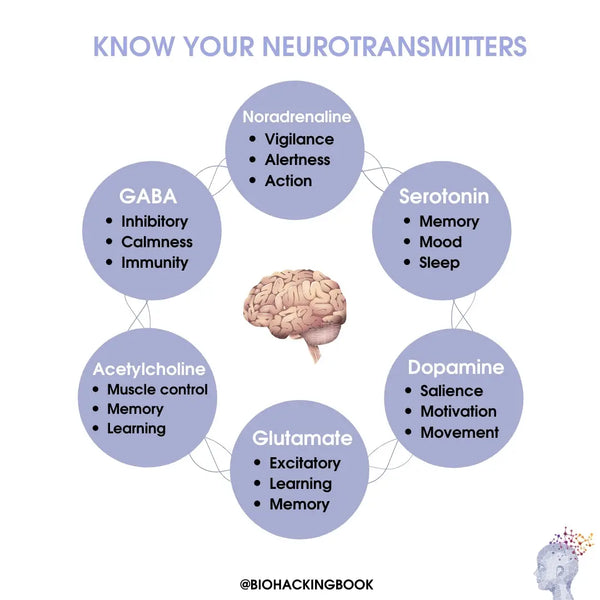
Many foods (especially protein-rich foods) contain molecules that cells can use to build brain-signaling hormones (i.e., neurotransmitters) that are needed for optimal levels of energy, good memory, creativity and a happy mood. These hormones include dopamine (DA), acetylcholine (ACh), γ-aminobutyric acid (GABA), glutamate and serotonin. Building blocks to these neurotransmitters are found in foods such as meats, fish, eggs, fruits, edible plants, roots and botanicals.
For example, eating foods high in folate (which belongs to the class of B vitamins) can reduce depressive symptoms in depressed patients. Folate has an important role in the synthesis of dopamine and serotonin – both of which are required for mood, motivation and energy. Serotonin is also important for sleep, and dopamine is important for motor movements.
Mechanism #3: Diet Supports Brain Health Via the Gut-Brain Axis
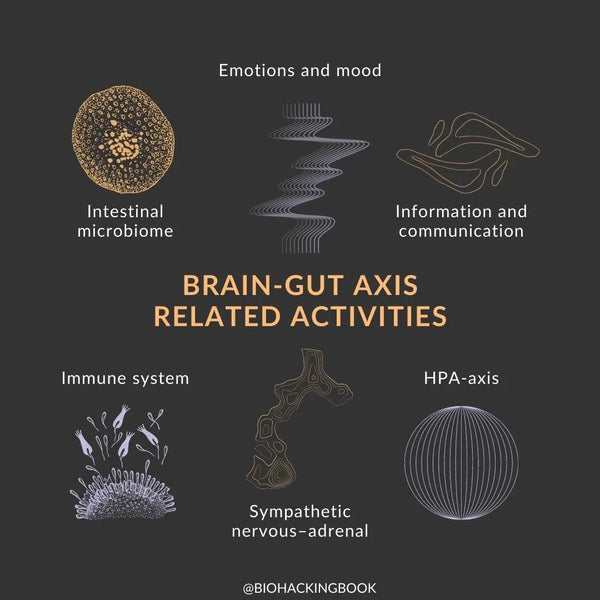
Gut and Neurotransmitters
Diet impacts the condition of the gut microbiota (the microorganisms that live in your gut). Gut microbiota modulate hormone production in the intestines. Some of these hormones travel to the brain via blood, having a direct impact on the brain, whereas others influence the brain by increasing or decreasing nervous system activity. The gut produces some of the most important hormones for brain functioning. For example, approximately 90 % of serotonin (important for mood, memory and sleep) is produced in the digestive tract. Abnormal levels of serotonin are linked to gut problems (such as IBS, constipation and cramps), mood problems (hostility, impulsivity, irritability), brain fog and depression.
It is important to get tryptophan from the diet to make enough serotonin. Tryptophan is an amino acid found in high-protein foods. In the body, tryptophan gets converted into 5-hydroxytryptophan (5-HTP), which is used to make both serotonin and melatonin. Tryptophan-rich diets can support the healthy production of serotonin production in the gut and improve sleep, memory and contentment. Unlike serotonin, 5-HTP can freely travel to the brain (i.e., it can cross the blood-brain barrier), which increases serotonin production in the brain itself.
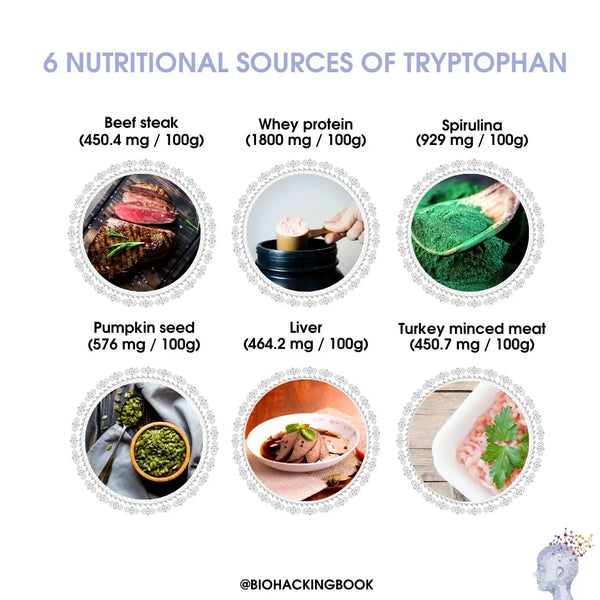
Foods that improve the gut microbiota, such as probiotics and fermented foods, can increase GABA signaling in the central nervous system. GABA is a neurotransmitter that is important for calmness, relaxation, and sleep. According to a study done on mice, improving the gut microbiota can reduce anxiety and improve calmness and concentration.
Gut and the Vagus Nerve
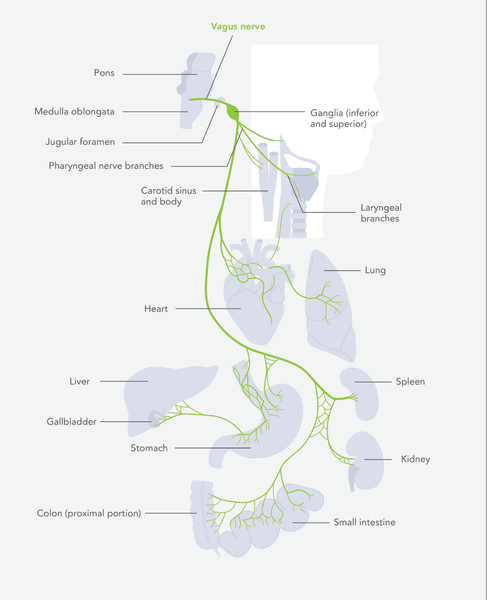
Gut and the brain have a reciprocal relationship. This link, known as the gut-brain axis, operates via a long nerve called the vagus nerve. Vagus nerve originates from the brainstem and connects to specific receptors on the surface of the gut. The nerve fibers of the vagus nerve are the signaling highway from the gut to the brain. Vagus nerve links the brain to many other internal organs as well, including the lungs, heart, liver and kidneys.
Signals from the gut to the brain make it possible to assess levels of satiety, need for food intake and the state of bowel movement. Some of the gut hormones that change the activation of the vagus nerve are cholecystokinin (CCK, which increases bile secretion), ghrelin (stimulates appetite) and leptin (inhibits hunger and signals about satiety). They sense nutrients in the gut, relay the signals to the brain and modify the feelings and behaviors related to hunger, satiety and eating. The vagus nerve has an effect on many functions of the gut, such as digestion and nutrient absorption, storage and mobilization.
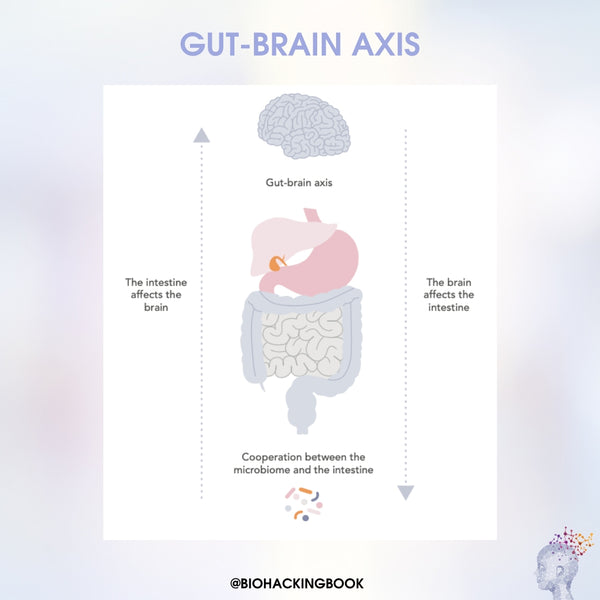
A poor diet can lead to inflammation in the gut and create a so-called vicious circle (Lat. circulus vitiosus) between the health of the gut and health of the brain. For example, when inflammation creates gaps in the gut surface between epithelial cells, gut permeability increases. This means that some harmful substances from the intestines can enter into blood circulation. This is common in conditions such as inflammatory bowel disease (IBD), low-level inflammation or celiac disease. This can also create mental stress, nervous system imbalance and brain fog.
Similarly, impaired brain function, stress or anxiety can weaken the function of the vagus nerve and cause digestive problems. It weakens the function of the immune system and reduces blood circulation in the intestines, which in turn increases the growth of harmful fungi and bacteria in the intestine. Harmful bacteria and fungi damage the surface tissue of the intestines and increase gut permeability (this is also known as a leaky gut syndrome).
Due to gut permeability, the messenger substances enter the blood circulation and the brain via the blood-brain barrier. The inflammation also increases the permeability of the blood-brain barrier. The result is a chronic inflammatory condition of the brain that impairs brain function and may cause anxiety and depression.
Therefore, taking care of gut health becomes fundamentally important if the goal is to protect the brain, balance mood and have the focus and energy for meaningful work and social relationships.
Mechanism #4: Diet Can Improve Brain Size and Shape (Neuroplasticity and Neurogenesis)
Just as your weight and body composition change in response to your diet, food can also affect the structure and function of the brain. This is driven by a mechanism called neuroplasticity. It means that the brain tissue can flexibly reshape: some areas can shrink and some enlarge and new signaling pathways can be formed. Indeed, this is exactly what happens when you learn new information or form new memories.
These changes in the brain structure are largely driven by lifestyle factors such as diet, sleep, exercise and environment. Type of diet, the timing of eating and diet composition can change the brain's efficiency in producing new neurons, renewing the old ones and clearing out the damaged ones.
In one study, researchers studied a group of mice with damaged brains and deficiencies in folate metabolism. Researchers gave some of the mice B vitamins (including vitamin B6, riboflavin and folate) and a choline supplement. They noticed that brain recovery and growth were better and faster in the brains of the mice who got additional folate and choline through their diet compared to the brains of the mice who did not eat extra folate or choline.
This shows the importance of these nutrients for brain renewal after injury. It has also been noticed that omega-3 fatty acids [α-linolenic acid (ALA), eicosapentaenoic acid (EPA) and docosahexaenoic acid (DHA)] enhance nerve cell growth in the hippocampus, a brain area that is important for memory, mood and learning. You can get long-chain omega-3 fatty acids (EPA & DHA) from fish, fish roe and algae and short-chain omega-3 fatty acids (ALA) from nuts and chia seeds.
The Blood-Brain Barrier (BBB) and Nutrient Transportation to the Brain
Less than 5 % of the drugs that you take can enter the brain. In other words, your brain blocks more than 95 % of ingested drugs. This number is strikingly high considering the fact that many diseases are currently treated only with pharmaceuticals. It also speaks to the wonderful ability of your brain to block harmful substances. There is a protective layer in the blood vessels around the brain, which is called the blood-brain barrier (BBB). It is made of tightly-packed cells (endothelial cells, pericytes and astrocytes) that prevent toxins and unrecognized substances from entering the brain. BBB is found in all blood vessels that surround the brain and the spinal cord.
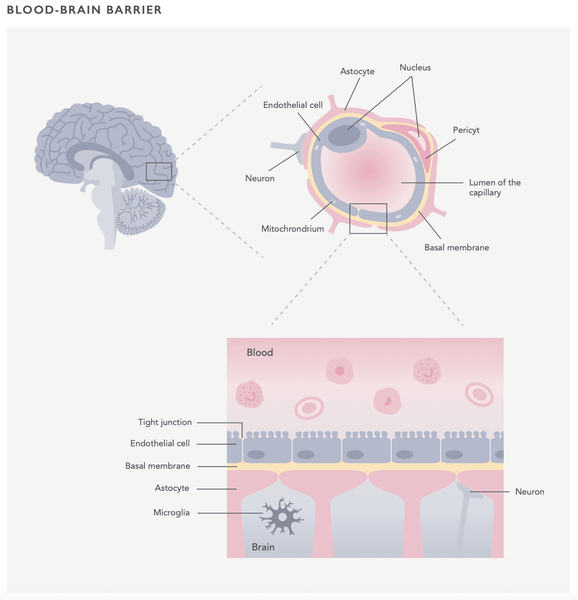
BBB has two intriguing qualities. First, it is very thick. Second, it includes so-called “gatekeeper cells” that make careful security checks for molecules that try to pass through it. Since the cells of the blood-brain barrier are so tightly packed, only very tiny molecules can pass through the barrier. Interestingly, the gatekeeper cells seem to block the majority of man-made synthetic drugs as unidentified “suspicious” agents. That is why scientists are still struggling to develop drugs that would be small enough to access the brain. This makes it hard to directly treat brain diseases such as Alzheimer’s or Parkinson’s disease. However, the benefit of such an efficient barrier is that it also blocks the majority of the harmful toxins because it lacks receptors that recognize their molecular structure. This wonderful mechanism protects the brain from pathogens, viruses and other harmful substances.
How does food actually affect the brain?
Gatekeeper cells have a special memory for all the important molecules that help to maintain homeostasis in the brain. They allow access to the nutrients such as glucose and iron needed to maintain healthy brain function, steady energy levels and maintain a balanced emotional state. For example, when you eat a spoonful of honey, glucose travels to the blood vessels around the brain, and the gatekeeper cells make a security check to the molecule recognizing it as glucose and grant access for it to enter the brain to provide energy. Also, protective antioxidants and fats need to enter the brain quickly due to the brain’s high metabolic activity rate throughout the day.
Scientists are working hard to develop methods that help therapeutic drugs and nutraceuticals to pass the blood-brain barrier to treat brain diseases such as Alzheimer’s disease, traumatic brain injury or stroke. Sometimes drugs are packed into nanoparticles that mimic nutrients – these act as “Trojan horses”, which are fooling the brain to think that it is letting in nutrients instead of the drug.
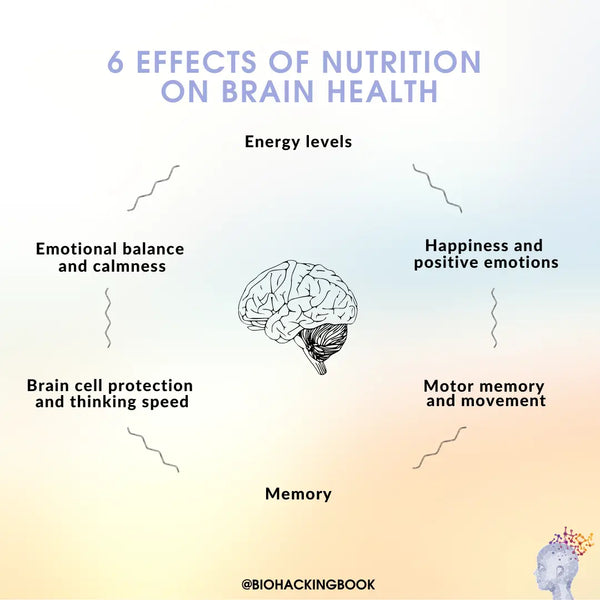
Three main transport mechanisms that deliver nutrients into the brain:
- Carrier-mediated transport selectively delivers small molecules like sugars, amino acids, vitamins and trace elements
- Receptor-mediated transport delivers large biomolecules, lipoproteins, peptide and protein hormones (such as iron, leptin, ghrelin, and insulin)
- Passive diffuse mechanism moves fat-soluble compounds, water and some gasses to the brain across the cell membrane (such as alcohol, nicotine and caffeine)
Nutrients that cross the blood-brain barrier:
- Glucose – provides energy for the brain
- Ketones – provide energy for the brain
- Fatty acids (such as omega-3 and omega-6) – strengthen synapses and neuronal growth
- Amino acids – help produce neurotransmitters
- Antioxidants and vitamins – help protect the brain from unwanted waste products
- Trace elements (such as zinc, copper, magnesium and iron) via metal ion transporters – function as cofactors facilitating the activation of other enzymes
Different Types of Brain Food Categories
#1: Neuroprotective Herbs and Foods
Neuroprotective foods include antioxidants and other beneficial molecules that protect the brain cells from damage and death (i.e., they slow down neurodegeneration). These foods are researched in the context of Alzheimer’s disease, stroke and traumatic brain injury (TBI) because they can slow down neuronal loss and help in growing new brain cells. To do this, neuroprotective foods can activate neurotransmitter receptors, build neurotransmitters and change enzymatic neuronal activity. They are high in antioxidants and protect the brain cells from oxidative stress by reversing some of the negative effects caused by free radicals.
Some neuroprotective foods also prevent toxicity caused by excessive glutamate in the brain. Glutamate is a key neurotransmitter that plays an important part in memory formation and activating brain cells. However, abnormally high concentrations of glutamate overexcite nerve cells, which can lead to brain cell death. This is observed in Huntington’s disease, for example.
Neuroprotective foods include:
- Panax ginseng
- Scutellaria baicalensis (huángqín)
- Turmeric (and curcumin)
- Red grape juice (resveratrol and other phenolic compounds)
- Bilberries and other strong-colored berries
- Omega-3 fatty acids
- Green tea
- Coffee
#2: Nootropics
Nootropics are compounds that can improve cognitive processing, thinking and mental clarity while also protecting the brain. These are sometimes called "smart drugs" or "cognitive enhancers" because they can improve performance in cognitive tests such as memory tests, reaction time tests and tests of sustained attention (i.e., focus and concentration).
Nootropic examples:
- Coffee
- L-theanine
- Acetyl-L-carnitine
- Citicoline
- DHA
- Brahmi
- Rhodiola rosea
- Creatine
A more thorough review and summary of nootropics is found in the forthcoming Biohacker's Brain Nutrition Book.
#3: Antidepressant Foods
Antidepressant foods can improve mood and decrease depression by improving hormonal function, neurotransmitter balance and energy metabolism in the body. They are abundant in vitamins and minerals such as folate, iron, omega-3 fatty acids, magnesium, potassium, selenium, thiamine, vitamin A, vitamin B6, vitamin B12, vitamin C and zinc.
- Oysters
- Mussels
- Organic meat products
- Leafy greens (such as watercress, swiss chard, dark lettuces, spinach, etc.)
- Fresh herbs
- Peppers
- Cruciferous vegetables
///
Do you want to support your cognitive health with our exclusive supplements? Check our best picks below!- Elsavie exclusive fiber blend with Magnesium and Guarana
- Not Your Average Coffee with aswagandha
- Lion's mane powder
Learn more, buy: Biohacker's Brain Nutrition Guide.





